Langtian Qin
Towards Decentralized Task Offloading and Resource Allocation in User-Centric Mobile Edge Computing
Dec 03, 2023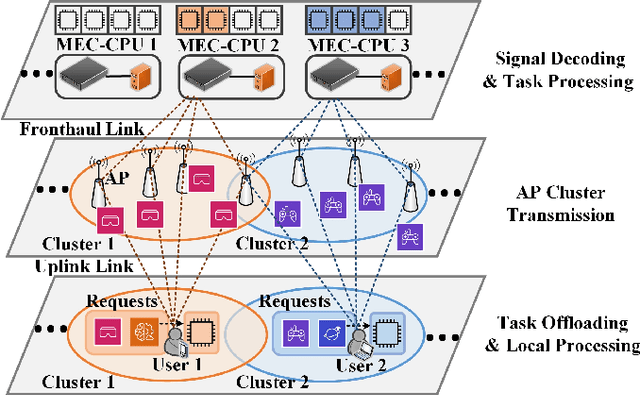
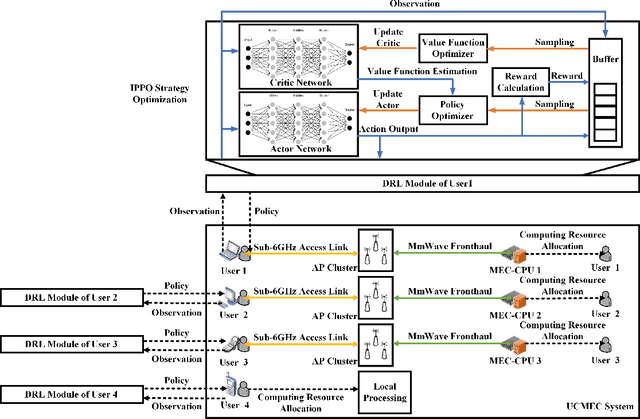
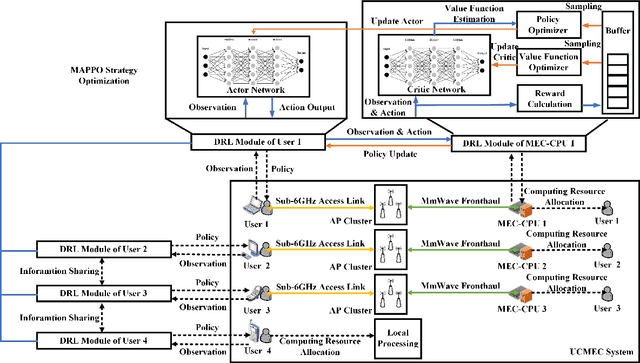
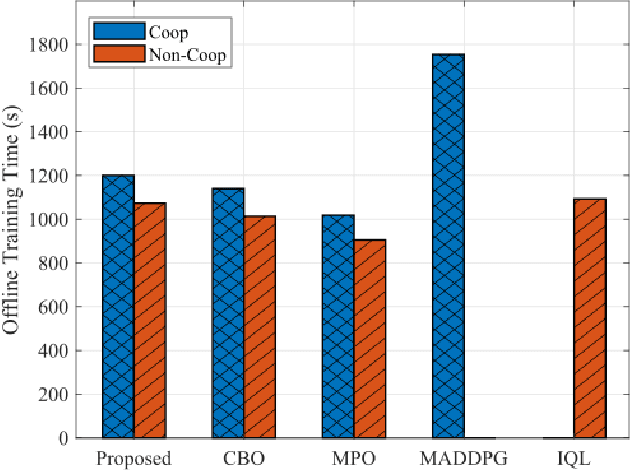
Abstract:In the traditional cellular-based mobile edge computing (MEC), users at the edge of the cell are prone to suffer severe inter-cell interference and signal attenuation, leading to low throughput even transmission interruptions. Such edge effect severely obstructs offloading of tasks to MEC servers. To address this issue, we propose user-centric mobile edge computing (UCMEC), a novel MEC architecture integrating user-centric transmission, which can ensure high throughput and reliable communication for task offloading. Then, we formulate an optimization problem with joint consideration of task offloading, power control, and computing resource allocation in UCMEC, aiming at obtaining the optimal performance in terms of long-term average total delay. To solve the intractable problem, we propose two decentralized joint optimization schemes based on multi-agent deep reinforcement learning (MADRL) and convex optimization, which consider both cooperation and non-cooperation among network nodes. Simulation results demonstrate that the proposed schemes in UCMEC can significantly improve the uplink transmission rate by at most 343.56% and reduce the long-term average total delay by at most 45.57% compared to traditional cellular-based MEC.
Streaming 360-degree VR Video with Statistical QoS Provisioning in mmWave Networks from Delay and Rate Perspectives
May 13, 2023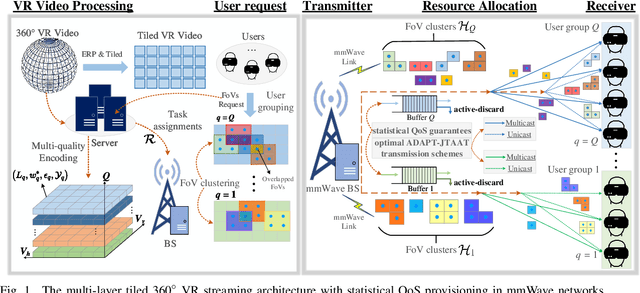

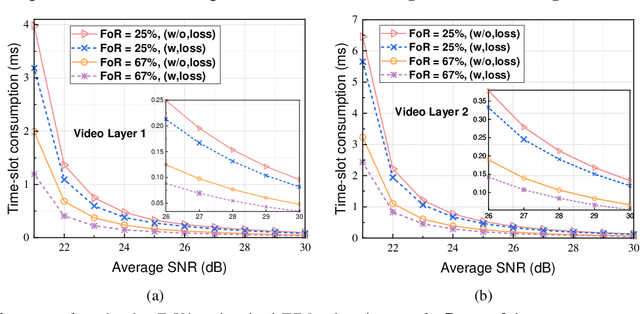
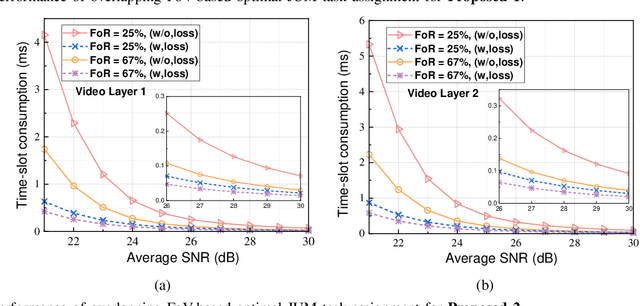
Abstract:Millimeter-wave(mmWave) technology has emerged as a promising enabler for unleashing the full potential of 360-degree virtual reality (VR). However, the explosive growth of VR services, coupled with the reliability issues of mmWave communications, poses enormous challenges in terms of wireless resource and quality-of-service (QoS) provisioning for mmWave-enabled 360-degree VR. In this paper, we propose an innovative 360-degree VR streaming architecture that addresses three under-exploited issues: overlapping field-of-views (FoVs), statistical QoS provisioning (SQP), and loss-tolerant active data discarding. Specifically, an overlapping FoV-based optimal joint unicast and multicast (JUM) task assignment scheme is designed to implement the non-redundant task assignments, thereby conserving wireless resources remarkably. Furthermore, leveraging stochastic network calculus, we develop a comprehensive SQP theoretical framework that encompasses two SQP schemes from delay and rate perspectives. Additionally, a corresponding optimal adaptive joint time-slot allocation and active-discarding (ADAPT-JTAAT) transmission scheme is proposed to minimize resource consumption while guaranteeing diverse statistical QoS requirements under loss-intolerant and loss-tolerant scenarios from delay and rate perspectives, respectively. Extensive simulations demonstrate the effectiveness of the designed overlapping FoV-based JUM optimal task assignment scheme. Comparisons with six baseline schemes validate that the proposed optimal ADAPTJTAAT transmission scheme can achieve superior SQP performance in resource utilization, flexible rate control, and robust queue behaviors.
Statistical QoS Provisioning Analysis and Performance Optimization in xURLLC-enabled Massive MU-MIMO Networks: A Stochastic Network Calculus Perspective
Mar 10, 2023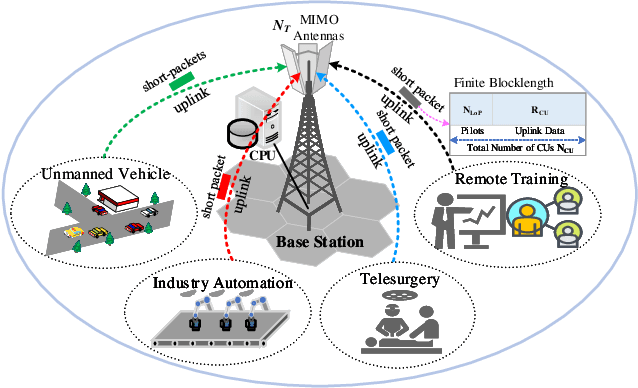

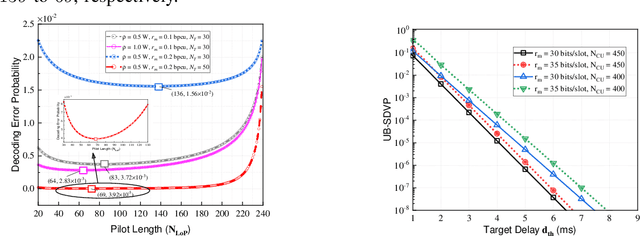
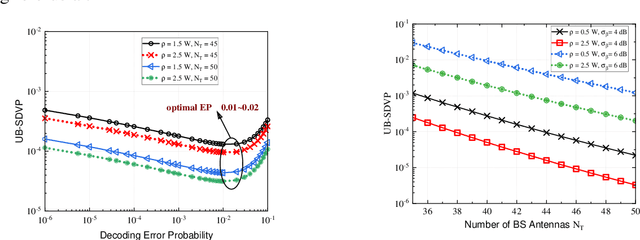
Abstract:In this paper, fundamentals and performance tradeoffs of the neXt-generation ultra-reliable and low-latency communication (xURLLC) are investigated from the perspective of stochastic network calculus (SNC). An xURLLC-enabled massive MU-MIMO system model has been developed to accommodate xURLLC features. By leveraging and promoting SNC, we provide a quantitative statistical quality of service (QoS) provisioning analysis and derive the closed-form expression of upper-bounded statistical delay violation probability (UB-SDVP). Based on the proposed theoretical framework, we formulate the UB-SDVP minimization problem that is first degenerated into a one-dimensional integer-search problem by deriving the minimum error probability (EP) detector, and then efficiently solved by the integer-form Golden-Section search algorithm. Moreover, two novel concepts, EP-based effective capacity (EP-EC) and EP-based energy efficiency (EP-EE) have been defined to characterize the tail distributions and performance tradeoffs for xURLLC. Subsequently, we formulate the EP-EC and EP-EE maximization problems and prove that the EP-EC maximization problem is equivalent to the UB-SDVP minimization problem, while the EP-EE maximization problem is solved with a low-complexity outer-descent inner-search collaborative algorithm. Extensive simulations demonstrate that the proposed framework in reducing computational complexity compared to reference schemes, and in providing various tradeoffs and optimization performance of xURLLC concerning UB-SDVP, EP, EP-EC, and EP-EE.
Joint Optimization of Base Station Clustering and Service Caching in User-Centric MEC
Feb 21, 2023Abstract:Edge service caching can effectively reduce the delay or bandwidth overhead for acquiring and initializing applications. To address single-base station (BS) transmission limitation and serious edge effect in traditional cellular-based edge service caching networks, in this paper, we proposed a novel user-centric edge service caching framework where each user is jointly provided with edge caching and wireless transmission services by a specific BS cluster instead of a single BS. To minimize the long-term average delay under the constraint of the caching cost, a mixed integer non-linear programming (MINLP) problem is formulated by jointly optimizing the BS clustering and service caching decisions. To tackle the problem, we propose JO-CDSD, an efficiently joint optimization algorithm based on Lyapunov optimization and generalized benders decomposition (GBD). In particular, the long-term optimization problem can be transformed into a primal problem and a master problem in each time slot that is much simpler to solve. The near-optimal clustering and caching strategy can be obtained through solving the primal and master problem alternately. Extensive simulations show that the proposed joint optimization algorithm outperforms other algorithms and can effectively reduce the long-term delay by at most $93.75% and caching cost by at most $53.12%.
Energy-Efficient Blockchain-enabled User-Centric Mobile Edge Computing
Feb 21, 2023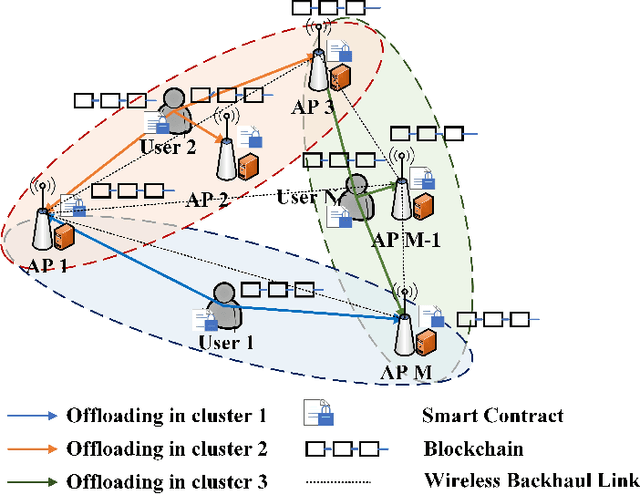

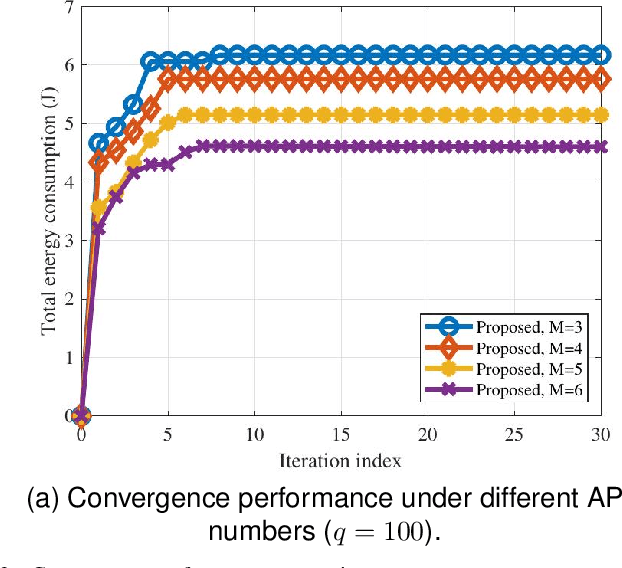
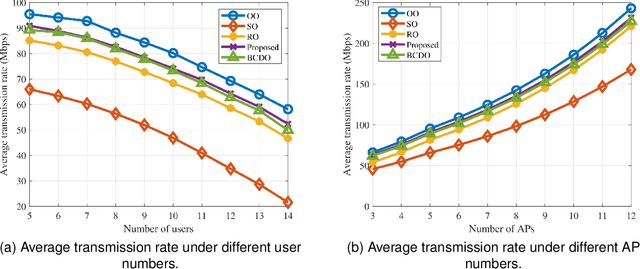
Abstract:In the traditional mobile edge computing (MEC) system, the availability of MEC services is greatly limited for the edge users of the cell due to serious signal attenuation and inter-cell interference. User-centric MEC (UC-MEC) can be seen as a promising solution to address this issue. In UC-MEC, each user is served by a dedicated access point (AP) cluster enabled with MEC capability instead of a single MEC server, however, at the expense of more energy consumption and greater privacy risks. To achieve efficient and reliable resource utilization with user-centric services, we propose an energy efficient blockchain-enabled UC-MEC system where blockchain operations and resource optimization are jointly performed. Firstly, we design a resource-aware, reliable, replicated, redundant, and fault-tolerant (R-RAFT) consensus mechanism to implement secure and reliable resource trading. Then, an optimization framework based on alternating direction method of multipliers (ADMM) is proposed to minimize the total energy consumed by wireless transmission, consensus and task computing, where APs clustering, computing resource allocation and bandwidth allocation are jointly considered. Simulation results show superiority of the proposed UC-MEC system over reference schemes, at most 33.96% reduction in the total delay and 48.77% reduction in the total energy consumption.
 Add to Chrome
Add to Chrome Add to Firefox
Add to Firefox Add to Edge
Add to Edge